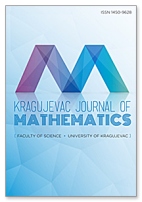Some Matrix and Compact Operators of the Absolute Fibonacci Series Spaces
 Download PDF
Download PDF
Authors: F. GöKçE AND M. A. SARIGöL
DOI: 10.46793/KgJMat2002.273G
Abstract:
In the present paper, we introduce the absolute Fibonacci space
 k, give
some inclusion relations and investigate topological and algebraic
structure such as BK-space, α-, β-, γ- duals and Schauder basis.
Further, we characterize certain matrix and compact operators on
these spaces, also determine their norms and Hausdroff meausures of
noncompactness.
k, give
some inclusion relations and investigate topological and algebraic
structure such as BK-space, α-, β-, γ- duals and Schauder basis.
Further, we characterize certain matrix and compact operators on
these spaces, also determine their norms and Hausdroff meausures of
noncompactness.
Keywords:
Absolute summability, Fibonacci numbers, matrix transformations, sequence spaces, bounded operators, Hausdroff meausures of noncompactness.
References:
[1] B. Altay and F. Başar, The fine spectrum and the matrix domain of the difference operator Δ on the sequence space ℓp (0 < p < 1), Commun. Math. Anal. 2(2) (2007), 1–11.
[2] B. Altay and F. Başar, Some paranormed Riesz sequence spaces of non-absolute type, Southeast Asian Bull. Math. 30(5) (2006), 591–608.
[3] B. Altay, F. Başar and M. Mursaleen, On the Euler sequence spaces which include the spaces lp and l∞ I, Inform. Sci. 176(10) (2005), 1450–1462.
[4] F. Başar and N. L. Braha, Euler-Cesàro difference spaces of bounded, convergent and null sequences, Tamkang J. Math. 47(4) (2016), 405–420.
[5] F. Başar, Summability Theory and Its Applications, Bentham Science Publishers, e-books, Monographs, Istanbul, 2012.
[6] F. Başar and B. Altay, On the space of sequences of p-bounded variation and related matrix map- pings, (English, Ukrainian summary) Ukrain. Mat. Zh. 55(1) (2003), 108–118, reprinted in Ukrainian Math. J. 55(1) (2003), 136–147.
[7] M. Başarır, F. Başar and E. E. Kara, On the spaces of Fibonacci difference absolutely p-summable, null and convergent sequences, Sarajevo J. Math. 12(25) (2016), 167–182.
[8] J. Boos and P. Cass, Classical and Modern Methods in Summability, Oxford University Press, New York, 2000.
[9] H. Bor, On summability factors of infinite series, Tamkang J. Math. 16(1) (1985), 13–20.
[10] H. Bor and B. Thorpe, On some absolute summability methods, Analysis 7(2) (1987), 145–152.
[11] T. M. FLett, On an extension of absolute summability and some theorems of Littlewood and Paley, Proc. Lond. Math. Soc. 7 (1957), 113–141.
[12] G. C. Hazar and M. A. Sarıgöl, Compact and matrix operators on the space |C,−1|k, J. Comput. Anal. Appl. 25 (2018), 1014–1024.
[13] G. C. Hazar and F. Gökçe, Characterizations of matrix transformatios on the series spaces derived by absolute factorable summability, Developments in Science and Engineering (2016), 411–426.
[14] A. M. Jarrah and E. Malkowsky, Ordinary absolute and strong summability and matrix transformations, Filomat 17 (2003), 59–78.
[15] E. E. Kara, Some topological and geometrical properties of new Banach sequence spaces, J. Inequal. Appl. 2013(1) (38) (2013), 16 pages.
[16] E. E. Kara and M. Ilkhan, On some Banach sequence spaces derived by a new band matrix, Br. J. Math. Comput. Sci. 9(2) (2015), 141–159.
[17] E. E. Kara and M. Ilkhan, Some properties of generalized Fibonacci sequence spaces, Linear Multilinear Algebra 64(11) (2016), 2208–2223.
[18] V. Karakaya, A. K. Noman and H. Polat, On paranormed λ-sequence spaces of non-absolute type, Math. Comput. Modelling 54(5) (2011), 1473–1480.
[19] T. Koshy, Fibonacci and Lucas Numbers with Applications, John Wiley and Sons, New York, 2011.
[20] I. J. Maddox, Elements of Functinal Analysis, Cambridge University Press, London, New York, 1970.
[21] E. Malkowsky and V. Rakocević, On matrix domains of triangles, Appl. Math. Comput. 189(2) (2007), 1146–1163.
[22] E. Malkowsky and V. Rakocević, An introduction into the theory of sequence space and measures of noncompactness, Zb. Rad. (Beogr.) 9(17) (2000), 143–234.
[23] M. R. Mehdi, Summability factors for generalized absolute summability I, Proc. Lond. Math. Soc. 3(1) (1960), 180–200.
[24] R. N. Mohapatra and M. A. Sarıgöl, On matrix operators on
the series spaces  k, Ukrain Mat. Zh. 69(11) (2017), 1524–1533.
k, Ukrain Mat. Zh. 69(11) (2017), 1524–1533.
[25] M. Mursaleen, F. Başar and B. Altay, On the Euler sequence spaces which include the spaces lp and l∞ II, Nonlinear Anal. 65(3) (2006), 707–717.
[26] C. Orhan and M. A. Sarıgöl, On absolute weighted mean summability, Rocky Mountain J. Math. 23(3) (1993), 1091–1097.
[27] V. Rakocević, Measures of noncompactness and some applications, Filomat 12(2) (1998), 87–120.
[28] M. A. Sarıgöl, Spaces of series summable by absolute Cesàro and matrix operators, Communications in Mathematics and Applications 7(1) (2016), 11–22.
[29] M. A. Sarıgöl, Extension of Mazhar’s theorem on summability factors, Kuwait J. Sci. 42(3) (2015), 28–35.
[30] M. A. Sarıgöl, Matrix transformations on fields of absolute weighted mean summability, Studia Sci. Math. Hungar. 48(3) (2011), 331–341.
[31] M. A. Sarıgöl, Necessary and sufficient conditions for the
equivalence of the summability methods  k and
k and  k,
Indian J. Pure Appl. Math. 22(6) (1991), 483–489.
k,
Indian J. Pure Appl. Math. 22(6) (1991), 483–489.
[32] M. A. Sarıgöl, On the local properties of factored Fourier series, Appl. Math. Comput. 216(11) (2010), 3386–3390.
[33] M. A. Sarıgöl, On two absolute Riesz summability factors of infinite series, Proc. Amer. Math. Soc. 118(2) (1993), 485–488.
[34] M. A. Sarıgöl, On absolute weighted mean summability methods, Proc. Amer. Math. Soc. 115(1) (1992), 157–160.
[35] M. Stieglitz and H. Tietz, Matrix transformationen von Folgenraumen. Eine Ergebnisübersicht, Math. Z. 154(1) (1977), 1–16.
[36] W. T. Sulaiman, On summability factors of infinite series, Proc. Amer. Math. Soc. 115 (1992), 313–317.
[37] A. Wilansky, Summability Through Functional Analysis, Mathematics Studies 85, North Holland, Amsterdam, 1984.
